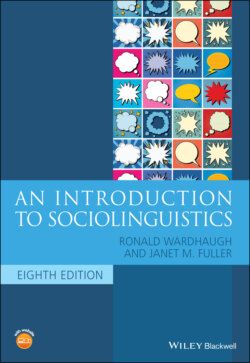Читать книгу An Introduction to Sociolinguistics - Ronald Wardhaugh, Janet M. Fuller - Страница 74
Beliefs about Language and Social Groups
ОглавлениеA key aspect of the study of language and social groups is that how languages are evaluated usually has very little to do with their linguistic features, and much more to do with the social status of the groups associated with them. These beliefs about linguistic groups also influence how language users use particular features and varieties of languages and are thus central to our understandings of social groups and language use.
Many people hold strong beliefs on various issues having to do with language and are quite willing to offer their judgments on these issues (see Bauer and Trudgill 1998; Niedzielski and Preston 1999). They believe such things as certain languages lack grammar, that you can speak English without an accent, that French is more logical than English, that parents teach their children to speak, that primitive languages exist, that English is degenerating and language standards are slipping, that pronunciation should be based on spelling, and so on and so on. Much discussion of language matters in the media concerns such ‘issues’ and there are periodic attempts to ‘clean up’ various bits and pieces, attempts that Cameron (1995) calls ‘verbal hygiene.’ Unfortunately, often people who voice opinions on this do not have any background in linguistics, but it has proven difficult to educate them otherwise. (But we hope that, after reading this book, you will go on to try.)
While sociolinguistic research on language largely focuses on a descriptive, not prescriptive, approach, attitudes and ideologies about language influence language use, as well as being areas of study in their own right. In the next two sections, we will look at two strands of research that address how such lay beliefs about language and social groups are an important part of the study of sociolinguistics.
